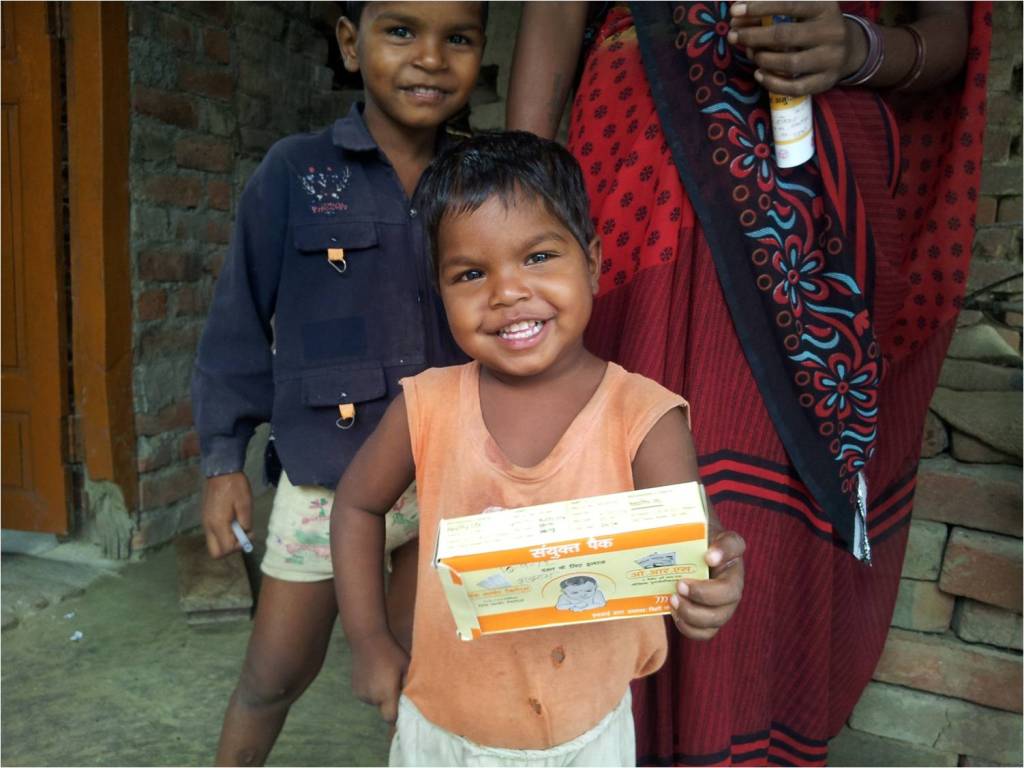Field Stories
Ten inspiring global nutrition stories
December 17, 2024
WP_Term Object
(
[term_id] => 49
[name] => Field Stories
[slug] => all-field-stories
[term_group] => 0
[term_taxonomy_id] => 49
[taxonomy] => news-category
[description] => Discover the personal stories of people whose lives have been impacted by better nutrition, and those working tirelessly to deliver it.
[parent] => 0
[count] => 180
[filter] => raw
)
Saving lives through better diarrhoea treatment: accomplishments in Bihar and Chhattisgarh
Since 2009, MI has been working in two of India’s high-burden states, Bihar and Chhattisgarh, to ensure that children suffering from diarrhoea get treated with zinc and oral rehydration salts (ORS).
Posted on November 16, 2015


In India, 11% of all under-five deaths can be attributed to childhood diarrhoea.
Since 2009, MI has been working in two of India’s high-burden states, Bihar and Chhattisgarh, to ensure that children suffering from diarrhoea get treated with zinc and oral rehydration salts (ORS): the effective, safe and low-cost combination therapy recommended by WHO, that helps in faster recovery, and helps build resistance against repeat episodes of diarrhoea.
Supporting the state government’s health departments, MI, through various health interventions, has helped to strengthen the zinc and ORS procurement and supply chain mechanisms, has trained health workers in managing childhood diarrhoea, worked with communities to promote awareness and boost demand for zinc and ORS, and has provided solutions to improve reporting of diarrhoea cases.
Under MI’s project, supported by the Children’s Investment Fund Foundation (CIFF) in Bihar since 2011, more than two million episodes of childhood diarrhoea have been reported treated in 15 demonstration districts; 70% of which have been treated at public health facilities using both zinc and ORS.
As gradual yet certain progress is made in combating this deadly disease, the road ahead remains challenging. Ensuring regular availability of zinc and ORS to the last mile is one such hurdle that MI seeks to overcome.
Despite the Government of India’s efforts to improve procurement of zinc and ORS, supply-side issues, such as lack of detailed product specifications in government procurement tenders, procurement of low-price but sub-optimal formulations, and supply stock-outs pose serious challenges in ensuring last mile availability.
In the first quarter of 2015, in the middle of a supply crisis of zinc and ORS in Bihar, MI helped the state government track down 10.3 million zinc tablets (deemed sufficient for treating 735,000 diarrhoea episodes) and 1.47 million packets of ORS. Swift planning and dispatch of these stocks in February resulted in health centres across all 38 districts of Bihar receiving zinc and ORS in time, right before children’s diarrhoea cases peaked in the summer. MI also worked simultaneously with the Government of Bihar to sort out supply and logistic issues with the vendor for future supplies of zinc and ORS.
As MI’s childhood diarrhoea project in Bihar culminates in 2015, MI has drawn from its key lessons and forged new ties with the Government of Chhattisgarh, with support from CIFF. Through this collaboration, MI is strengthening the state governments’ program for childhood diarrhoea management by training health workers on how to manage childhood diarrhoea using zinc and ORS, improve reporting of diarrhoea cases, and promote correct infant and young child feeding practices.
To ensure regular supplies of zinc and ORS in 2015-16, MI has supported the government in Chhattisgarh to draft the proposed procurement budget. So far, in the first quarter of 2015, 9.8 million zinc tablets (700,000 courses) have already been procured using state funds and have reached the community in their time of need.
Impact, in terms of the millions of young lives saved from diarrhoea, propels MI to continue working with health workers and governments alike, to ensure that all children suffering from diarrhoea receive better treatment with zinc and ORS, helping them to recover faster ― and potentially saving their lives.